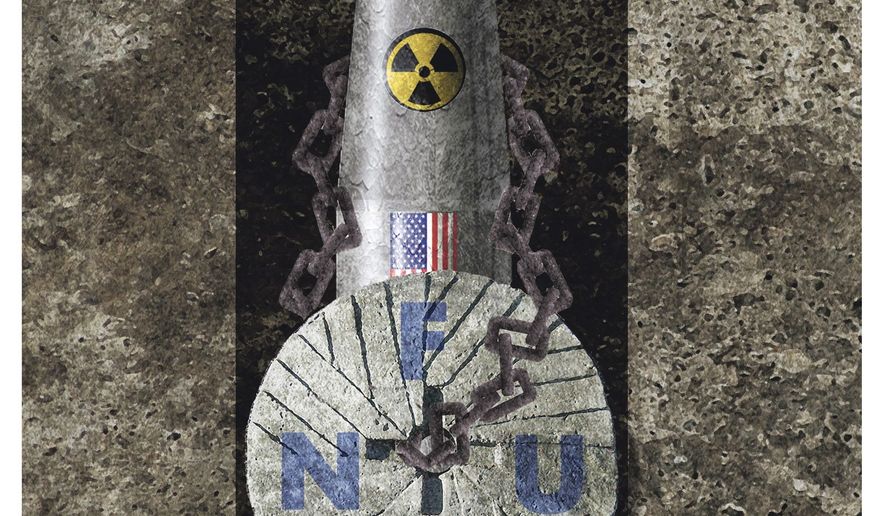OPINION:
Former President Donald J. Trump was frequently accused of trying to dismantle NATO when he demanded that the member nations live up to their obligation to invest in their own defense. President Joe Biden may soon do far worse by folding up the “nuclear umbrella” under which we and our allies have been sheltered from aggression.
Every president issues a relatively obscure document called the “nuclear posture review.” One of its principal purposes is to set US policy on the use of nuclear weapons. From the outset of the Cold War, our nuclear posture has been a carefully crafted strategic ambiguity. Because US use of nuclear weapons depends on the circumstances of an enemy’s aggression, the fact that enemies could only guess when we would use them was an effective deterrent to aggression.
With the help of White House advisers such as national security adviser Jake Sullivan, the Pentagon and the State Department are drafting a new nuclear posture review to be completed early next year when they will also issue a new “national military strategy.”
The biggest decision for Mr. Biden is whether his nuclear posture review will impose a dramatic change to our policy from strategic ambiguity to one of “no first use” or its euphemism, “sole purpose.”
A “no first use” (NFU) policy would commit that under no circumstance of a non-nuclear attack against the U.S. or our allies would we use nuclear weapons in response. The “sole purpose” policy is very much the same, promising that we would not be the first to use nuclear weapons to respond to a conventional, biological, chemical or cyberattack. Diplomats and liberal think tanks are busy splitting hairs to differentiate one from the other, but there is no real difference between them.
Mr. Biden reportedly doesn’t want the Pentagon to box him into the longstanding strategic ambiguity policy. At the same time, several important allies are reportedly lobbying Mr. Biden strenuously to stick with strategic ambiguity.
Our nuclear arsenal is comprised of very old weapons, but those of our principal adversaries, China and Russia, are being expanded constantly with newly-designed missiles, aircraft and ships. They produce five or six new weapon systems, each improving on the design of the last, in half the time we take to produce one. China is engaged in a massive buildup of its nuclear forces. Moreover, in a Chinese test of a nuclear-capable hypersonic boost-glide vehicle last summer, the Chinese reportedly fired a missile from the boost-glide weapon to land on a separate target. That capability reportedly shocked the Pentagon.
Add to that the fact that Mr. Biden’s Afghanistan withdrawal debacle greatly reduced America’s credibility among our allies and enemies. Mr. Biden’s pursuit of a revival of Mr. Obama’s 2015 nuclear deal with Iran also increases the danger of an enemy’s attack using nuclear weapons.
President Trump wanted to modernize our nuclear forces, but Mr. Biden is opposed to such an effort. It’s a safe bet that he would also oppose creating defenses to threats such as Russian and Chinese hypersonic weapons against which we have no defense.
All of those facts comprise the context in which the Biden nuclear posture is being developed.
The problem with both NFU and “sole purpose” is that under those policies, Russia, China and any other aggressor would be given carte blanche to launch any conventional attack on the US or our allies without fear of nuclear reprisal. Our “nuclear umbrella” would be collapsed and tossed in the trash.
We don’t know what Mr. Biden wants to do with NFU or “sole purpose,” but from a speech he gave in January 2017, just before he left the vice presidency, and a 2020 article he wrote, we must gather that he wants one or the other.
In the 2017 speech, Mr. Biden said it is “…hard to envision a plausible scenario in which the first use of nuclear weapons by the United States would be necessary. Or make sense.” In 2020, he wrote, “…the sole purpose of the US nuclear arsenal should be deterring — and if necessary, retaliating against — a nuclear attack.” It appears his mind is made up.
No president would want to choose a nuclear response to a conventional attack, but ambiguity is of enormous value. If an aggressor isn’t sure what we would do in response to a particular attack, no sane leader would risk a US nuclear response. Were we to adopt NFU or “sole purpose,” there would be no nuclear deterrent to any non-nuclear attack, even to devastating chemical, biological or cyber-attacks.
Mr. Biden is correct in desiring to reduce our reliance on nuclear forces to deter our enemies. Still, the alternative – investing tremendously in our cyber and other conventional forces – is something he is also dead set against.
When Mr. Obama was president, his national defense strategy spoke in bold, almost Churchillian, terms in defense of our nation and our allies. But they were empty words entirely disconnected from his actions.
We can expect the same from Mr. Biden’s national defense strategy. If he adopts “no first use” or “sole purpose” in his nuclear policy review, his national defense strategy will be a mockery of what it should be, and our deterrent will evaporate.
• Jed Babbin, a deputy undersecretary of Defense in the George H.W. Bush administration, is the author of “In the Words of Our Enemies.”




Please read our comment policy before commenting.